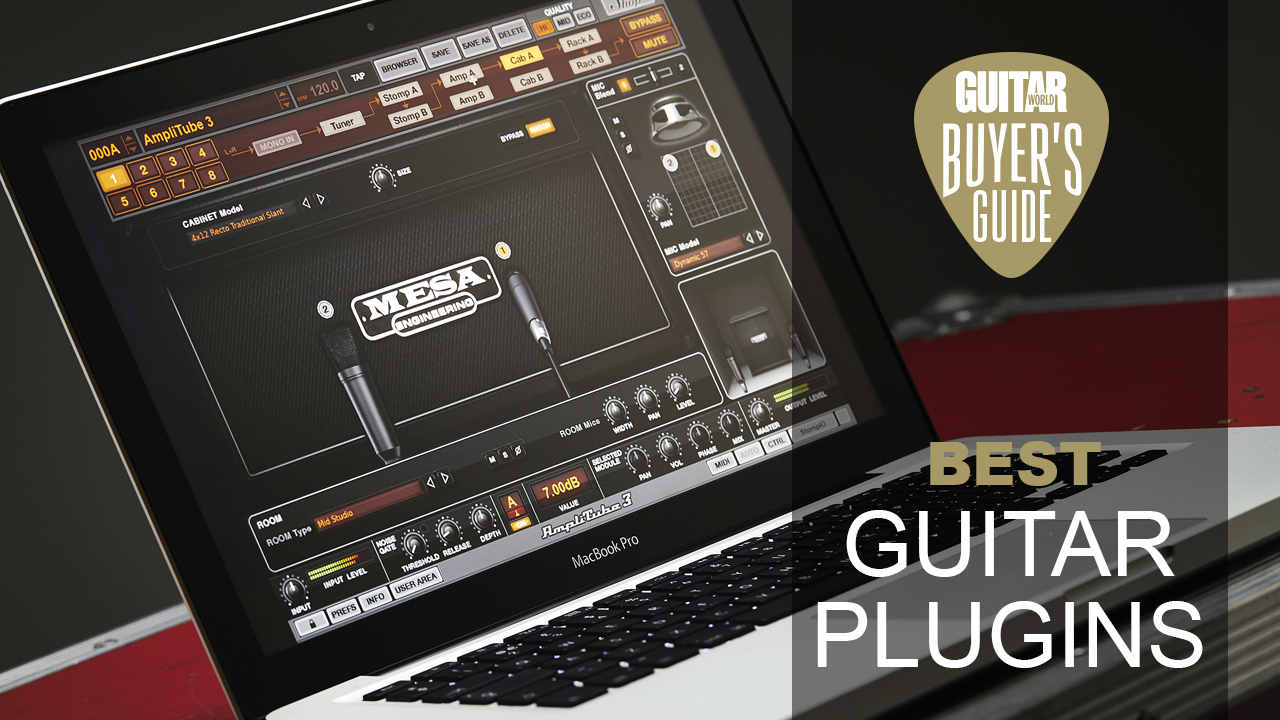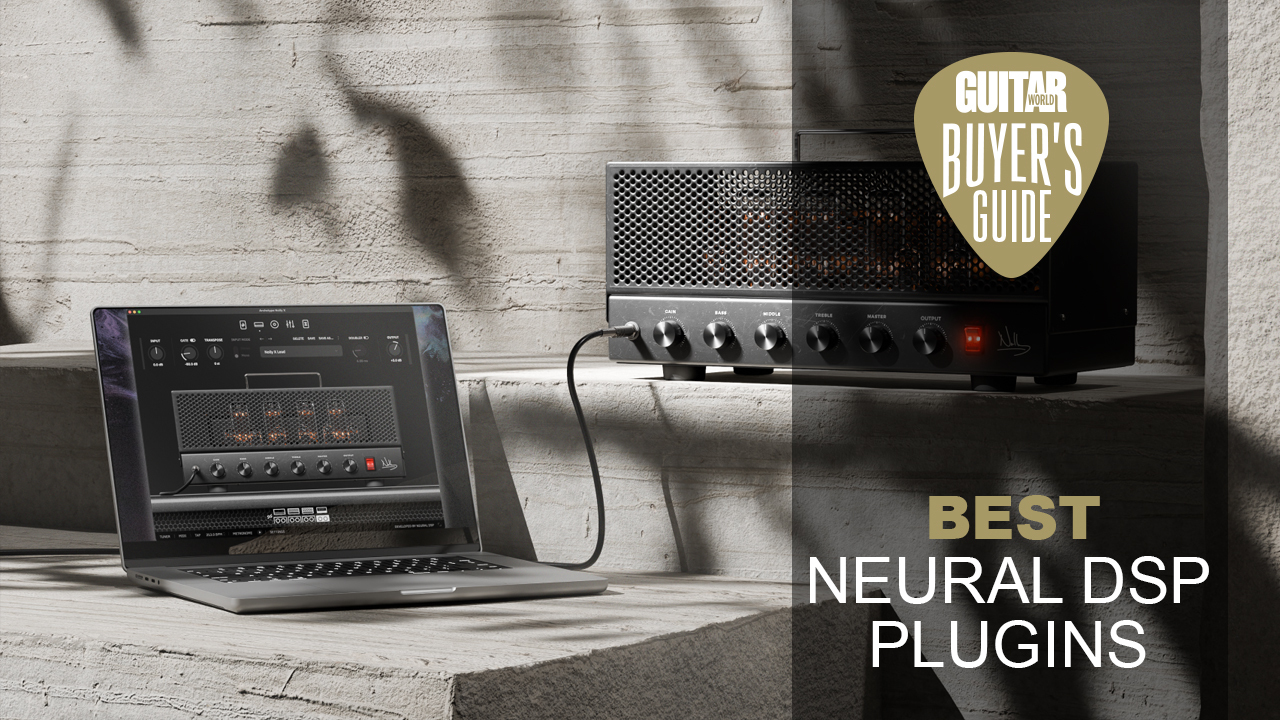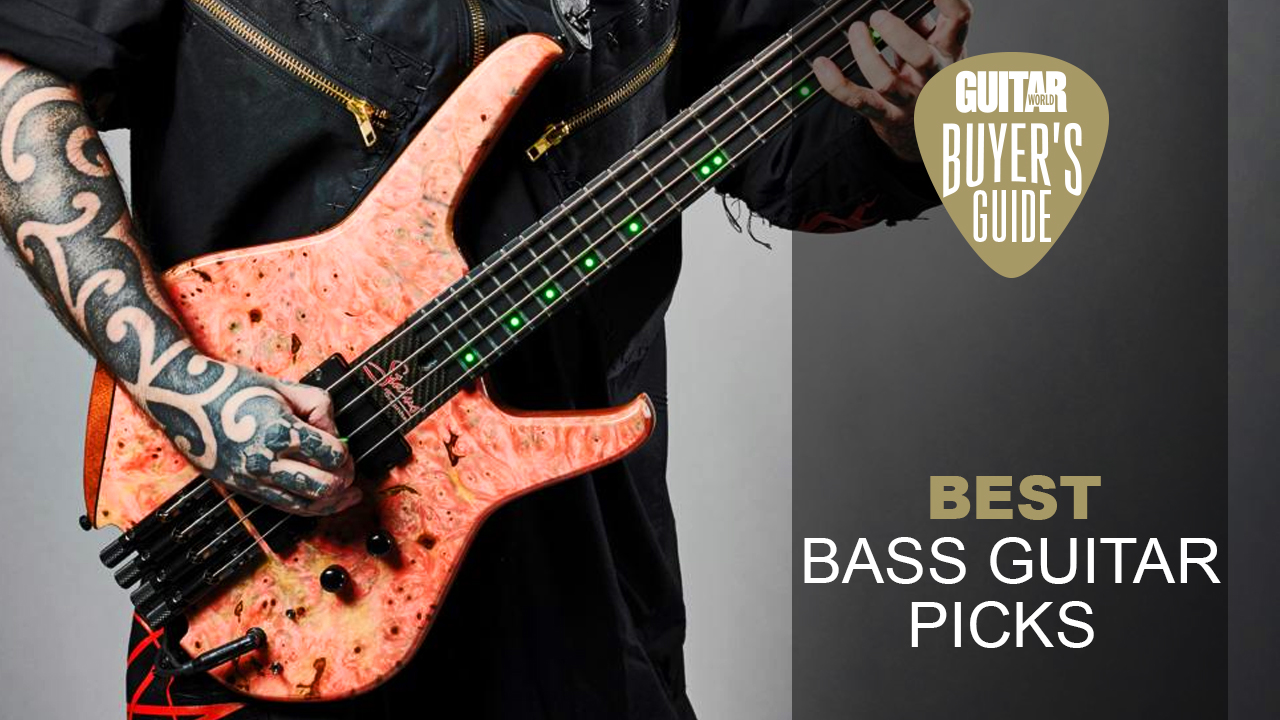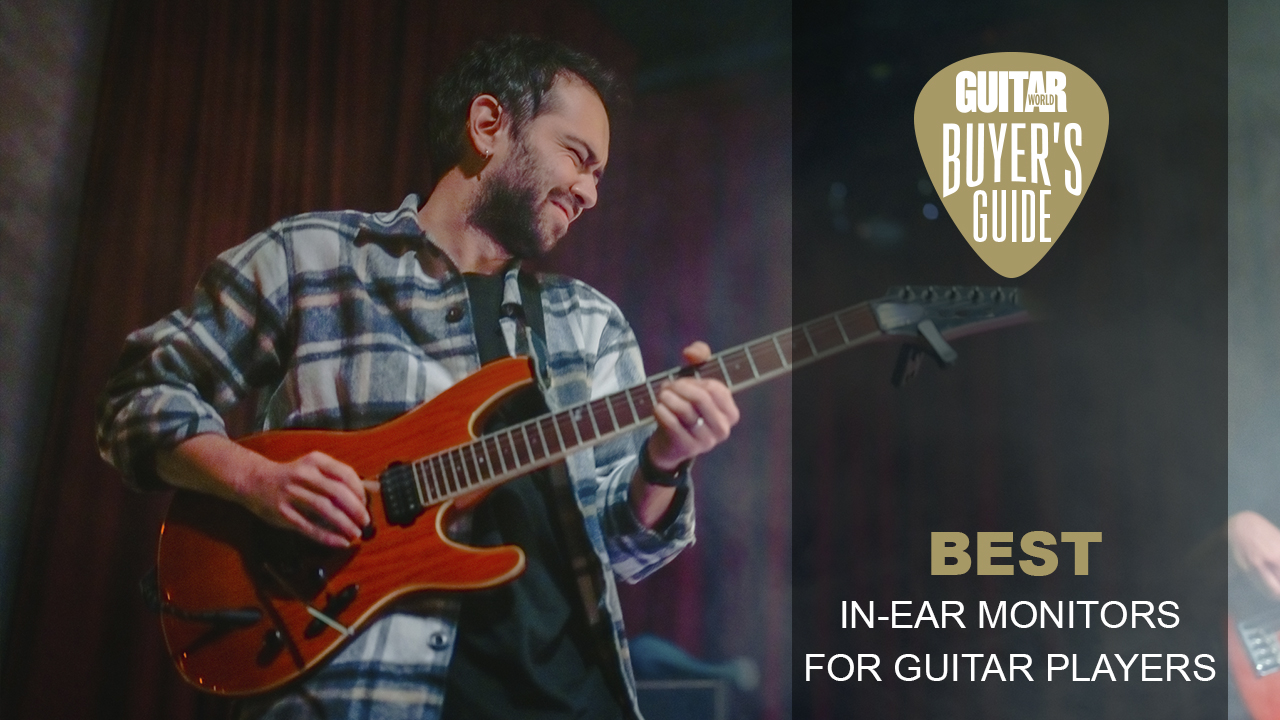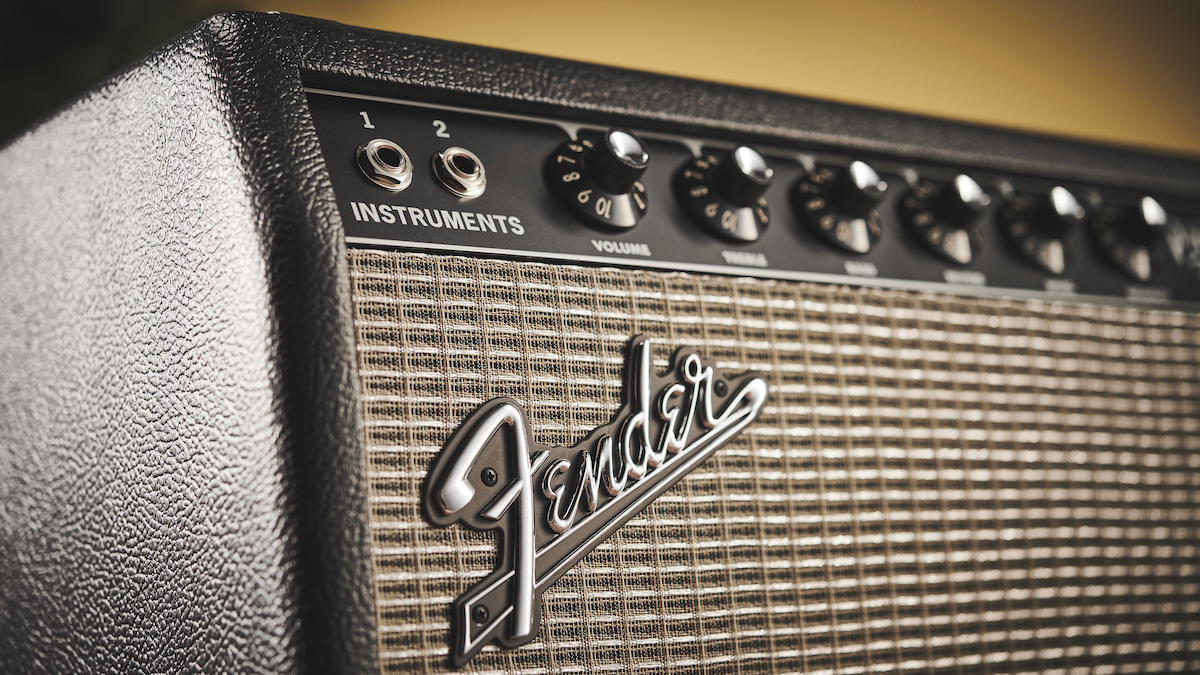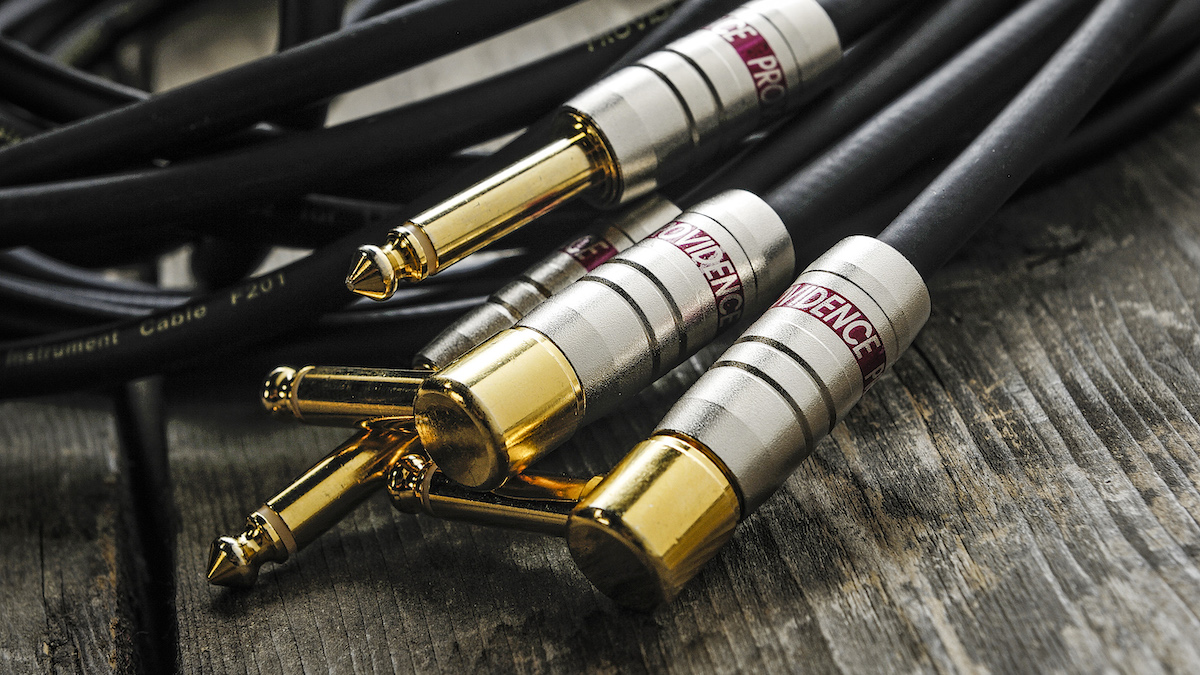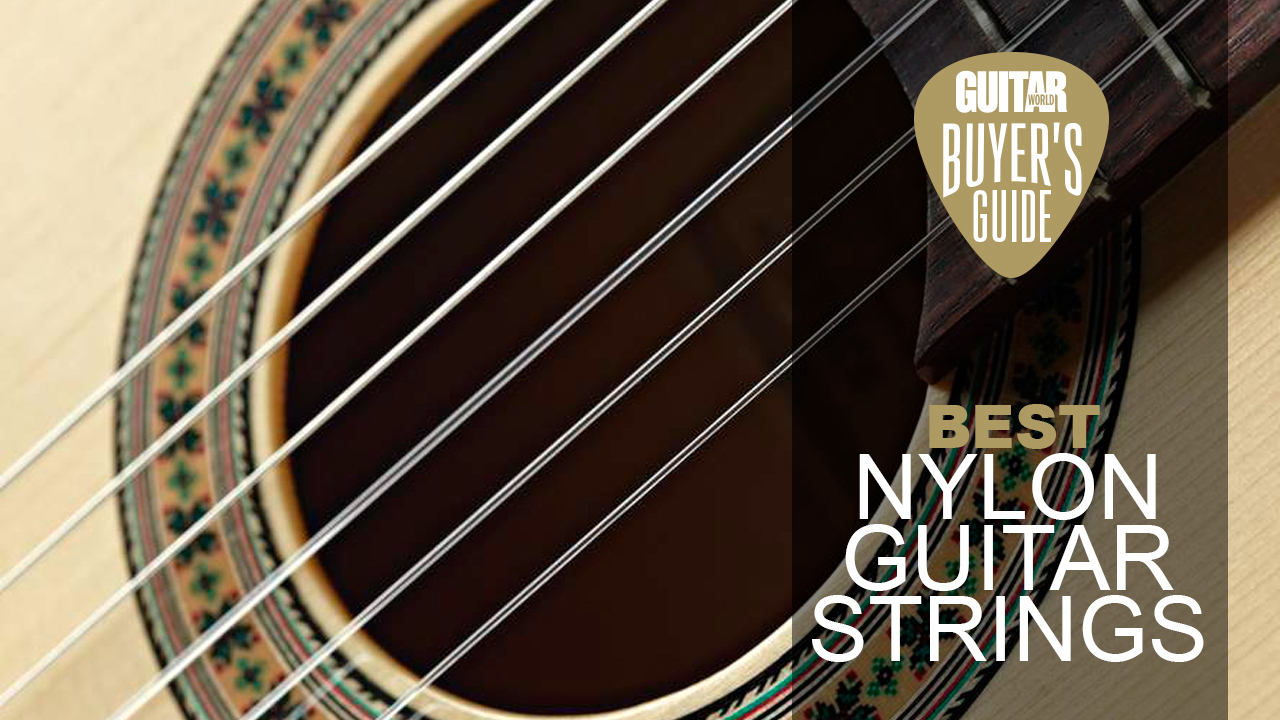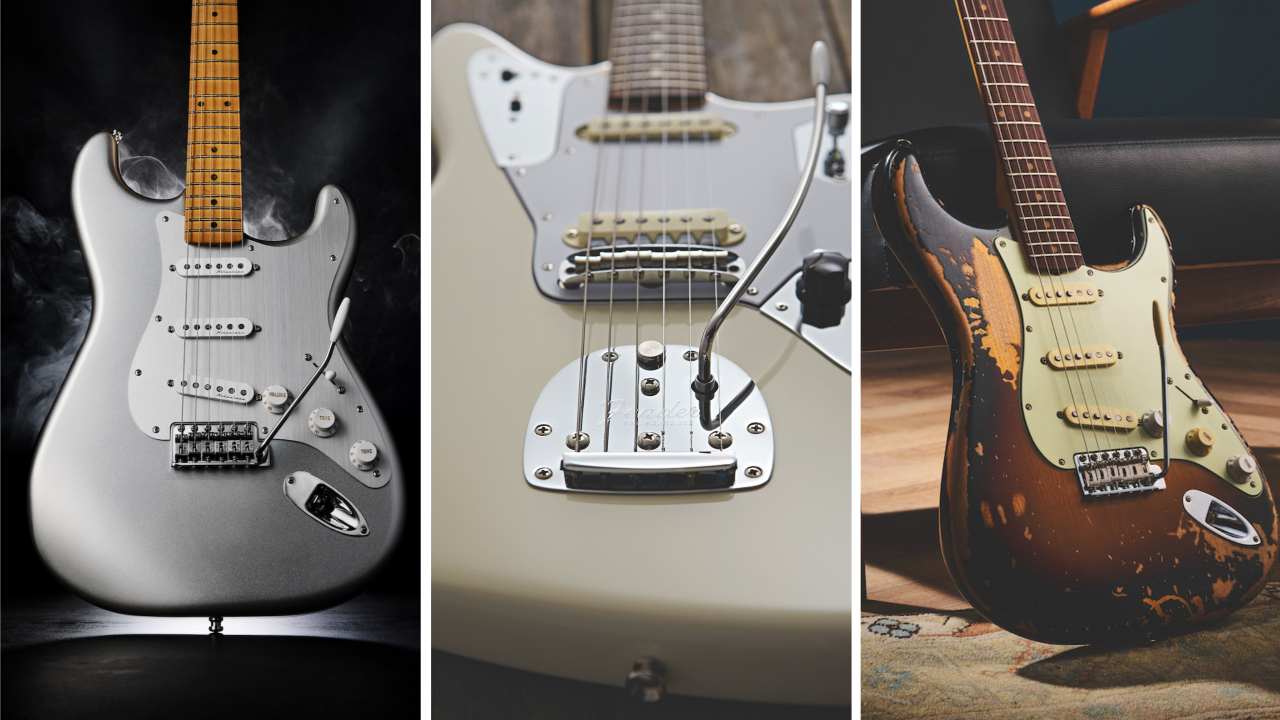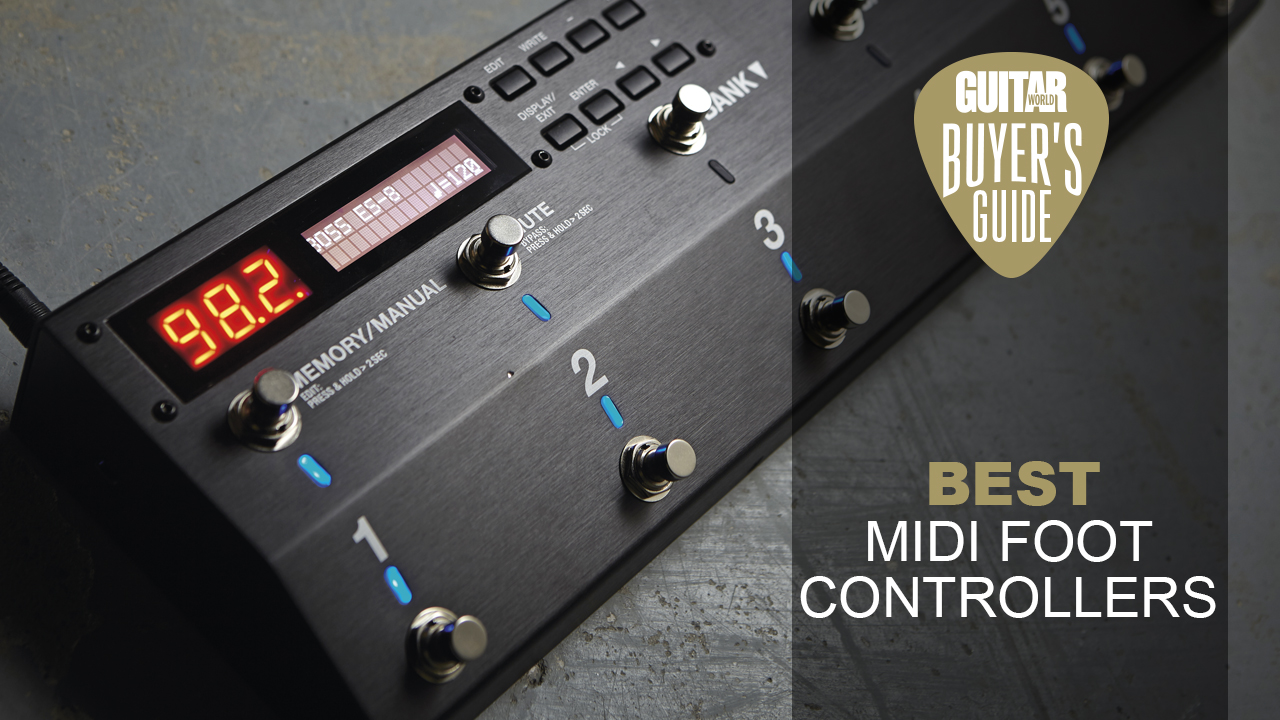Best parlor guitars 2025: sofa-strumming acoustics for every budget
The grandfather of acoustic guitars – our top parlor guitar picks from Gibson, Martin, Yamaha, and more
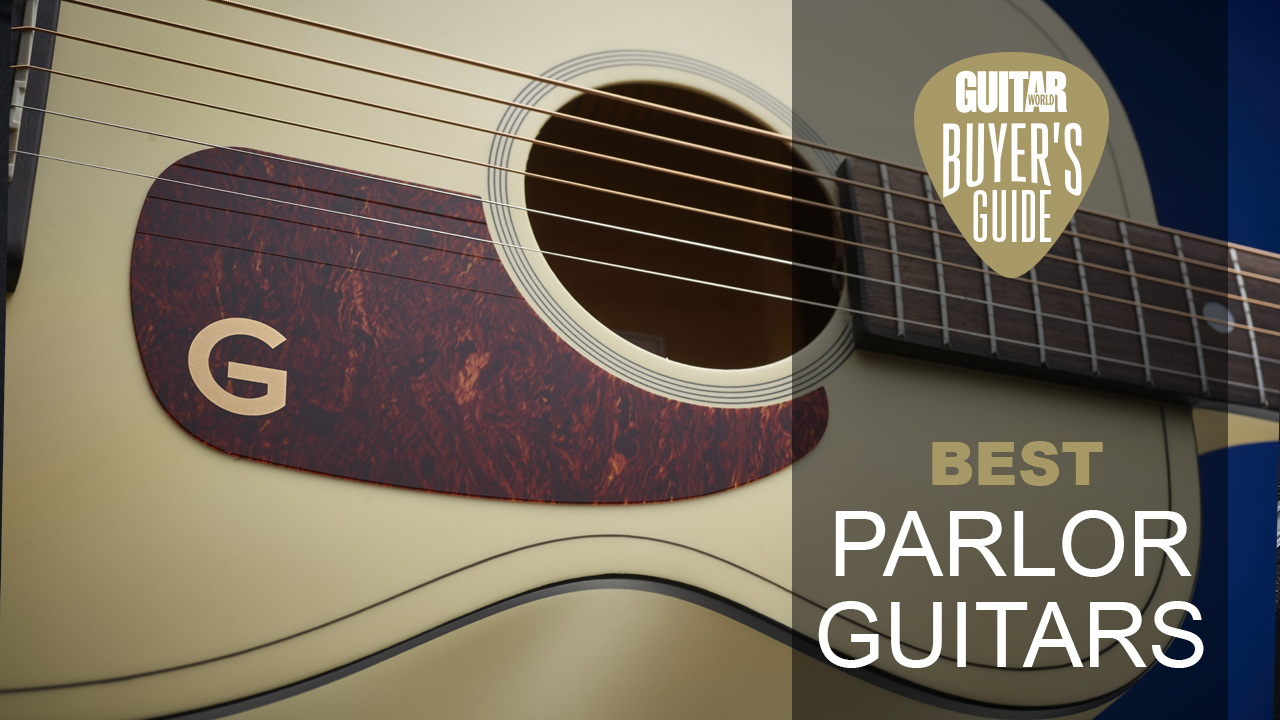
Parlor acoustic guitars have been around for a long, long time. These old-school acoustics take their name from the parlor rooms in which they were played in the 19th century. Nowadays, parlor guitars are favored by blues players, folk artists, singer-songwriters, recording engineers, and more. If you’re trying to find a compact acoustic guitar that’s punchy yet delicate, with lots of focus, then look no further than one of the best parlor guitars in this guide.
Their compact dimensions and narrow waist give them a fairly distinctive sound. They’re often quite mid-heavy, though they can be nice and bright too. The fact that they’re small also makes them a great choice for beginners and players of a smaller stature. People who have struggled to get their arms around a dreadnought or something similar will find these much easier to manage physically. The shorter scale length can also help them feel easy to play.
Though parlor guitars are a classic design, many top guitar brands continue to produce these surprisingly versatile acoustics. From heritage names like C.F. Martin to the expert craftsmanship of Yamaha, there’s a wealth of options to explore. Read on to discover the best parlor guitars on the market today.
Our top picks
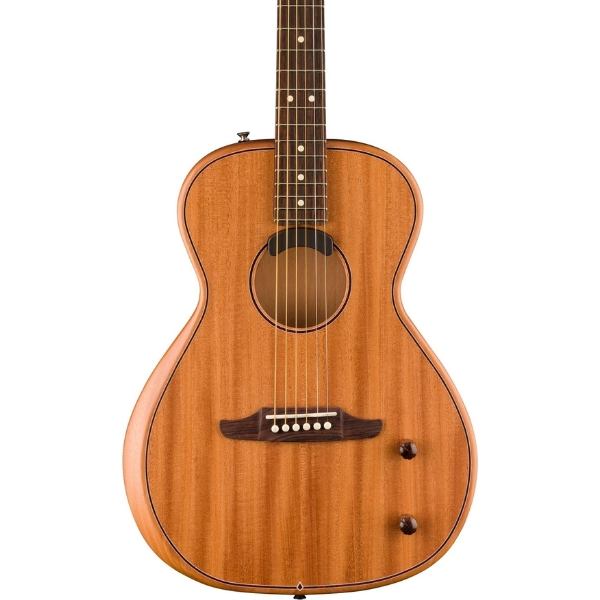
An innovative electro-acoustic, the Fender Highway Series takes the classic looks and body shape of a traditional parlor guitar, marrying it with modern tech to give you the best of both worlds.
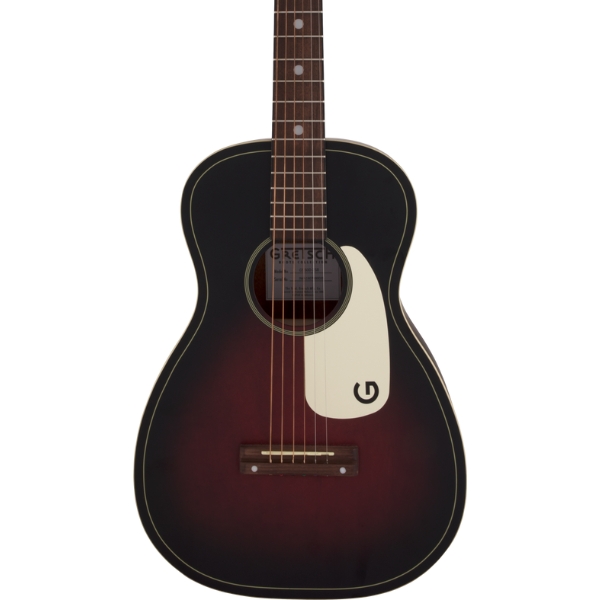
Combining fantastic good looks, excellent playability, and a budget-friendly price, the Gretsch Jim Dandy Parlor is a lot of guitar for relatively little money.
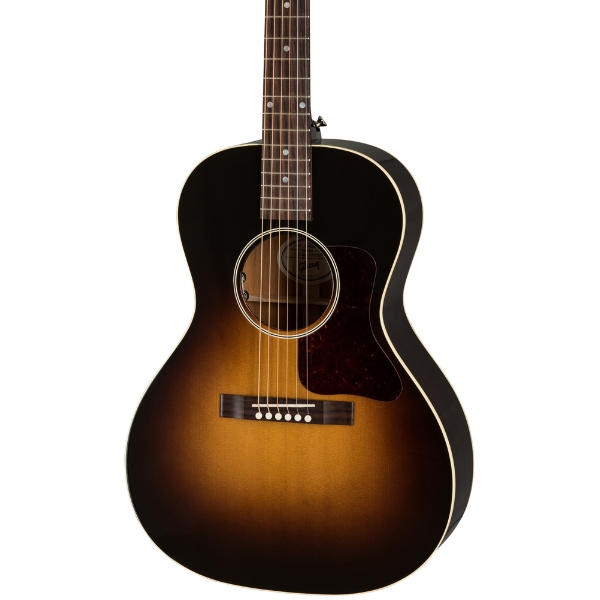
If you're looking for a premium acoustic to join you at gigs or just for some at-home strumming, the Gibson L-00 would be our top pick. Oozing vintage vibe and with a stunning tone, it's a fine guitar for fingerpicking.
Best overall
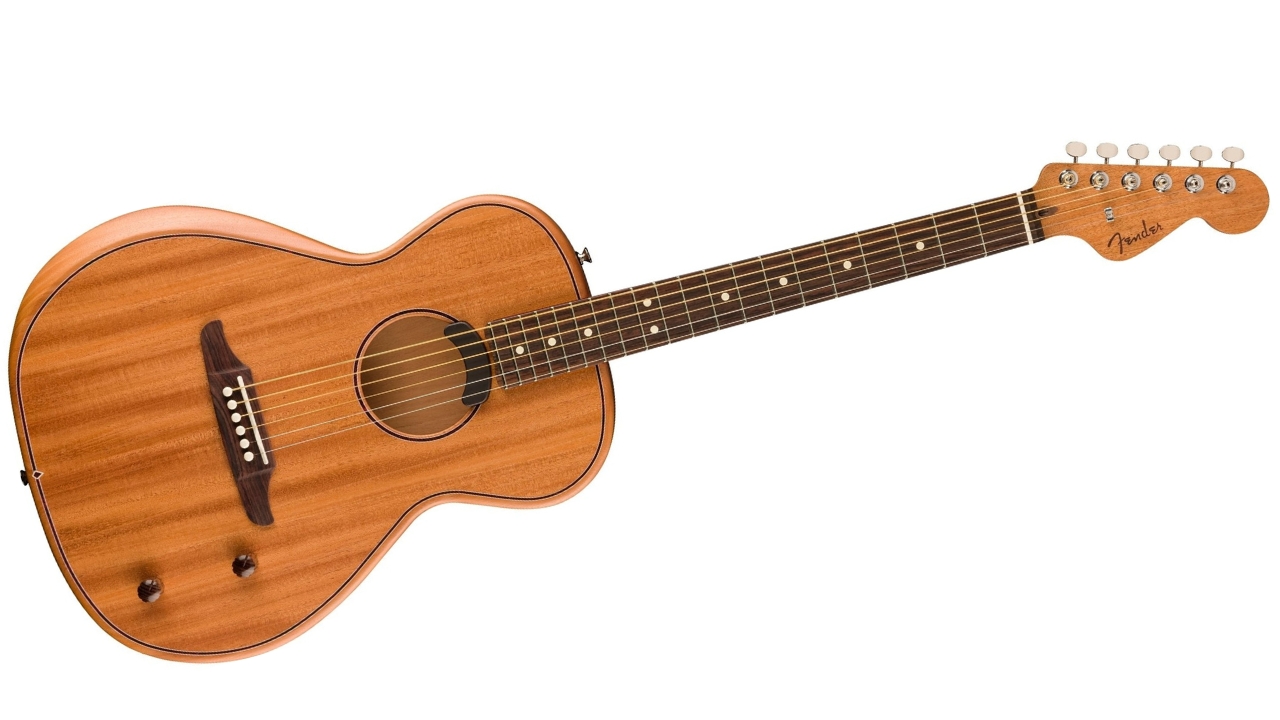
Specifications
Reasons to buy
Reasons to avoid
Starting with the Acoustasonic Telecaster in 2019, Fender’s Highway Series Parlor continues the innovative blend of electric and acoustic all-in-one guitars. Taking a step toward more traditional acoustic body shapes, the Highway Series Parlor is one of the most modern parlor guitars on the market.
Equipped with a Fishman-designed magnetic soundhole system, the Highway Series Parlor sounds fantastic plugged in. Unlike the Acoustasonic series, however, this parlor also holds its own acoustically, delivering a surprising amount of projection and a punchy tone that cuts through effortlessly.
The Highway Series maintains electric guitar-like playability within an acoustic-focused design, and the Parlor is no exception. With its slim body and familiar ‘C’-shaped neck profile, it practically plays itself. Coupled with the iconic 6-in-line Fender headstock, this guitar blurs the line between electric and acoustic like no other. Traditionalists may raise an eyebrow, but if you’re after the ultimate modern all-in-one parlor guitar, look no further.
Read our full Fender Highway Series Parlor review
Best budget
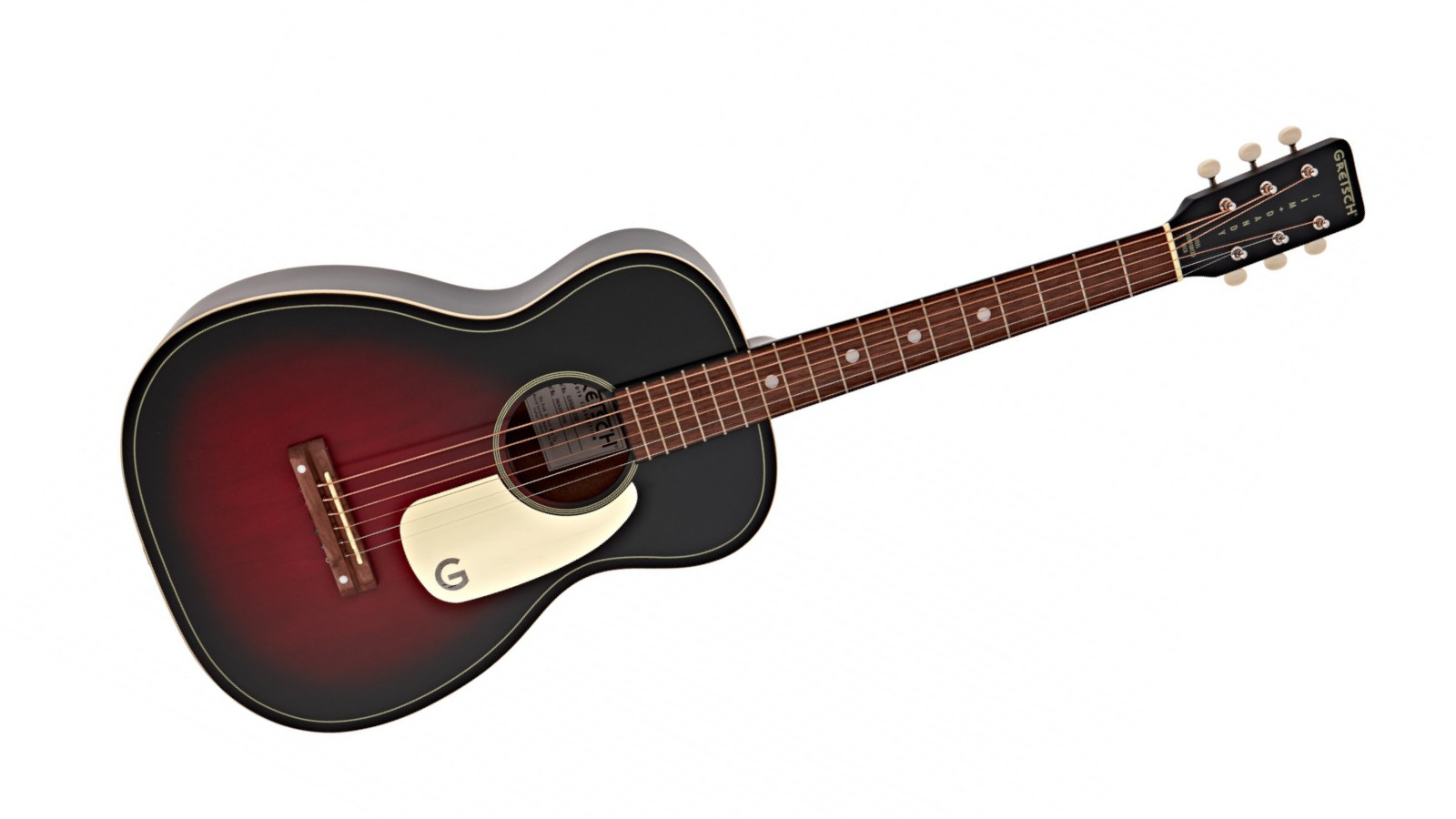
Specifications
Reasons to buy
Reasons to avoid
If you’re looking for an entry into the world of parlor guitars and don’t want to spend much, or if you’re seeking a cool-sounding first guitar, then the Gretsch Jim Dandy Parlor is worth considering. Inspired by guitars from the 1930s, ’40s, and ’50s, the famous Jim Dandy model from Gretsch has the classic parlor body shape yielding a warm and intimate sound, and perhaps more volume than you might expect from a guitar of this size.
Sure, this thing might not sound as good as models further up the line, but here you’re getting one of the best parlor guitars at this price point, from one of the most well-respected names in the business. The C neck profile and 24” scale make it comfortable to play for pretty much any style of player, plus the retro look gives it an instantly cool vibe.
Small details like the ‘G’ graphic on the pickguard, pinstripe purfling, and open-gear tuning machines come together to create an affordable parlor guitar that looks right at home in the hands of a bluesy fingerpicker on their porch.
Read our full Gretsch Jim Dandy G9500 review
Best high-end
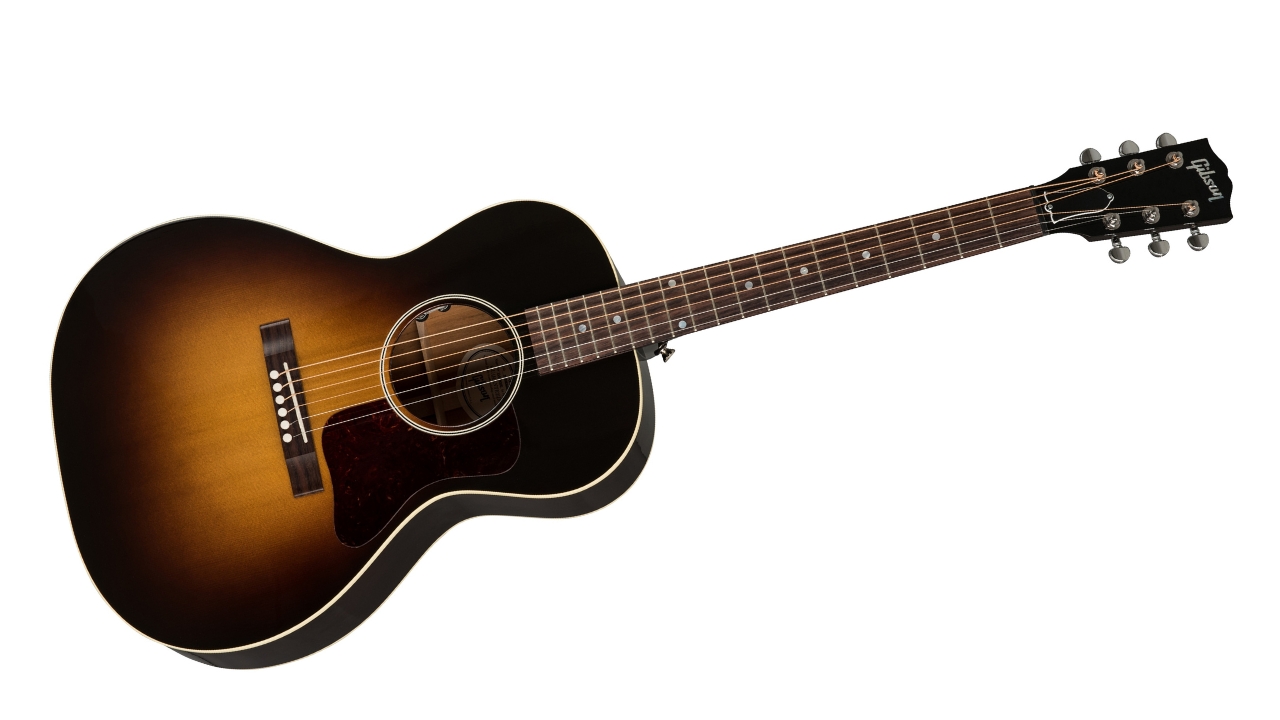
3. Gibson L-00 Standard
Our expert review:
Specifications
Reasons to buy
Reasons to avoid
Although it's technically not a parlor guitar according to Gibson themselves, we don't think anyone would balk at the inclusion of the superb Gibson L-00 Standard in this guide. The perfect option for players who want something premium, it's a superlative small-body acoustic for gigging, recording, or just playing on the sofa.
The all-solid tonewood combination delivers a classic Mahogany back and sides with a Sitka Spruce top combo, so you can cover a lot of ground with this guitar. It's got that typical 'boxy' parlor sound that's great for bluesy riffing, and we particularly love the sound of it played fingerstyle.
Like most parlor guitars it doesn't cope well with hard strumming, but that's to be expected here. It comes with an LR Baggs VTC Under Saddle Pickup so you can play it plugged in at shows, as well as a high-quality hard case to keep it safe when you're out and about.
Best durability
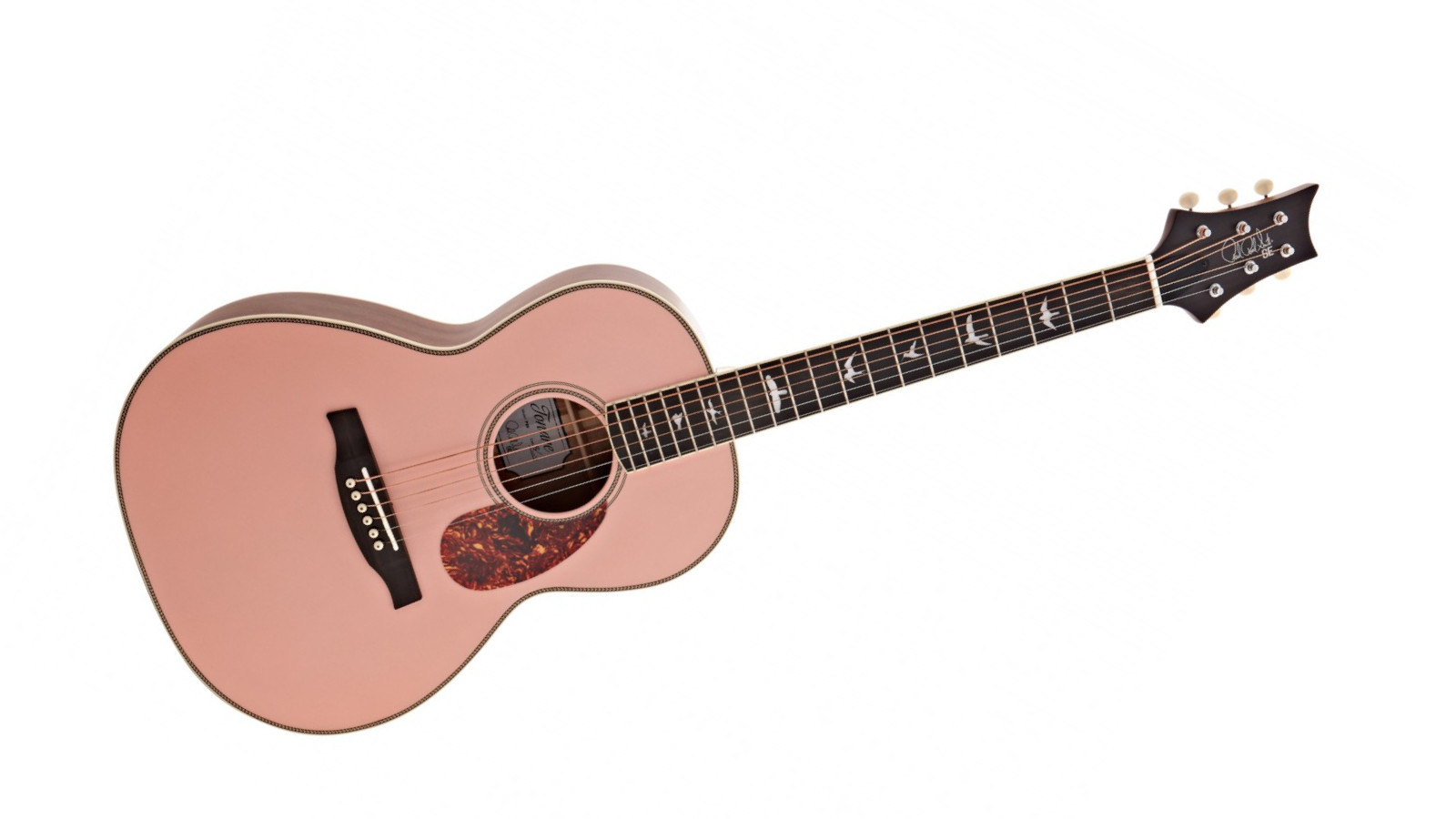
Specifications
Reasons to buy
Reasons to avoid
The all-mahogany construction and renowned PRS build quality make the SE PE20 one of the best parlor guitars that money can buy, especially when you’re considering value for money.
It’s a warm-sounding guitar, with lots of presence in the lower-mids. You get clarity when playing all over the neck, and considering its size, it can cut through a mix really well. The solid top means you get a rich sound that will improve with age.
PRS is known for building high-quality guitars, and, despite the PE20’s price tag, this is no exception. It makes for a superb instrument for beginners, with its size lending itself nicely to those less used to an acoustic guitar, but the PE20 is also a great workhorse guitar for more experienced players. This is enhanced by the onboard PRS-Voiced Fishman Presys VT pickup system that allows you to amplify your great parlor guitar sounds at gigs with ease.
Read our full PRS SE PE20 review
Best traditional
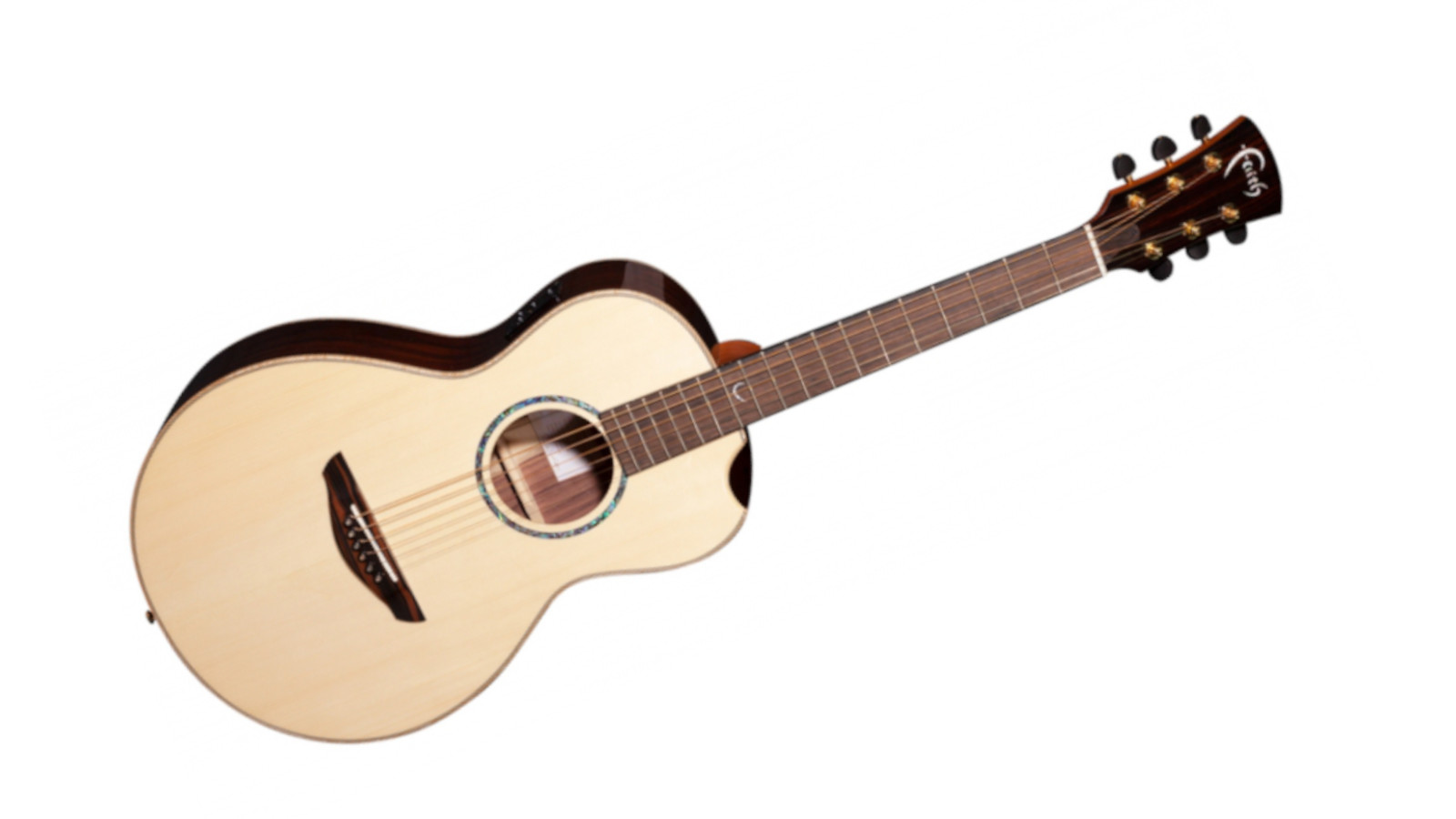
5. Faith Hi Gloss Mercury Top Scoop
Our expert review:
Specifications
Reasons to buy
Reasons to avoid
Okay so it doesn't necessarily look like a classic parlor guitar, but this is a really well-made, beautiful instrument featuring the classic wood combination of spruce and rosewood. Not many parlor guitars actually join the body at the 12th fret these days, but this one does.
It gives you a nice, bright tone, with lots of detail in the top end, and quite a big bass response too – more than you might expect of a guitar this size. Whilst the wood imparts a slight natural mid-scoop, you’ve still got the trademark parlor guitar sound. This well-crafted Faith is made from all solid woods too, so it’s lovely and rich sounding, with plenty of resonance.
The neck joins the body at the 12th fret, so there’s slightly less tension on the strings, making it feel really easy and loads of fun to play – plus it contributes to some of the sound, giving it a little more ‘oomph’. It boasts a whole host of other premium features too, such as high-quality Grover tuners, a figured ebony bridge, fingerboard and bridge pins, a hard case, an abalone rosette, and Fishman INK3 preamp with under saddle pickup. It’s not cheap, but it really is one of the best parlor guitars where quality is concerned.
Best value
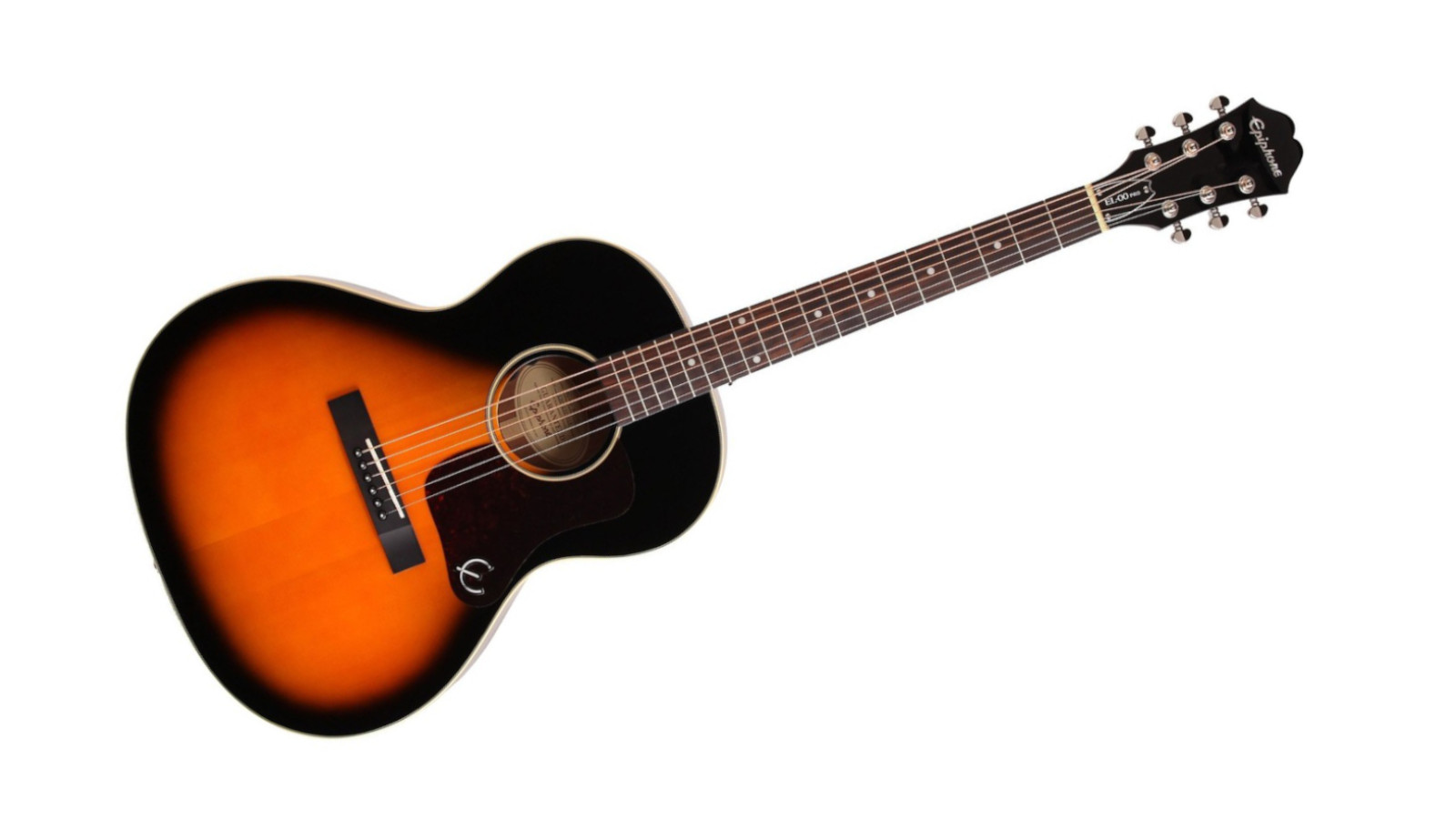
6. Epiphone L-00
Our expert review:
Specifications
Reasons to buy
Reasons to avoid
This incredibly well-priced offering from Epiphone harks back to the golden age of acoustic guitars as a direct descendant of one of the most popular models of the 1930s.
Boasting a solid spruce top, layered mahogany back and sides, and the classic parlor guitar body shape, the Epiphone L-00 is a dream for finger pickers and light strummers. It’s nice and bright, but also has a warm bottom end that will improve the more you play it. It’s got that nice, woody tone, with a responsive and immediate attack.
We love the fact that this model has a good quality pickup built in too. The onboard Fishman Sonicore pickup means you can plug in and play wherever you need to, making it the perfect accompaniment for singer-songwriters or those wanting to get started on the open-mic circuit. This classic guitar and its Gibson counterpart have been played by a bunch of legendary players over the years, including one of the greats – Bob Dylan.
Also consider
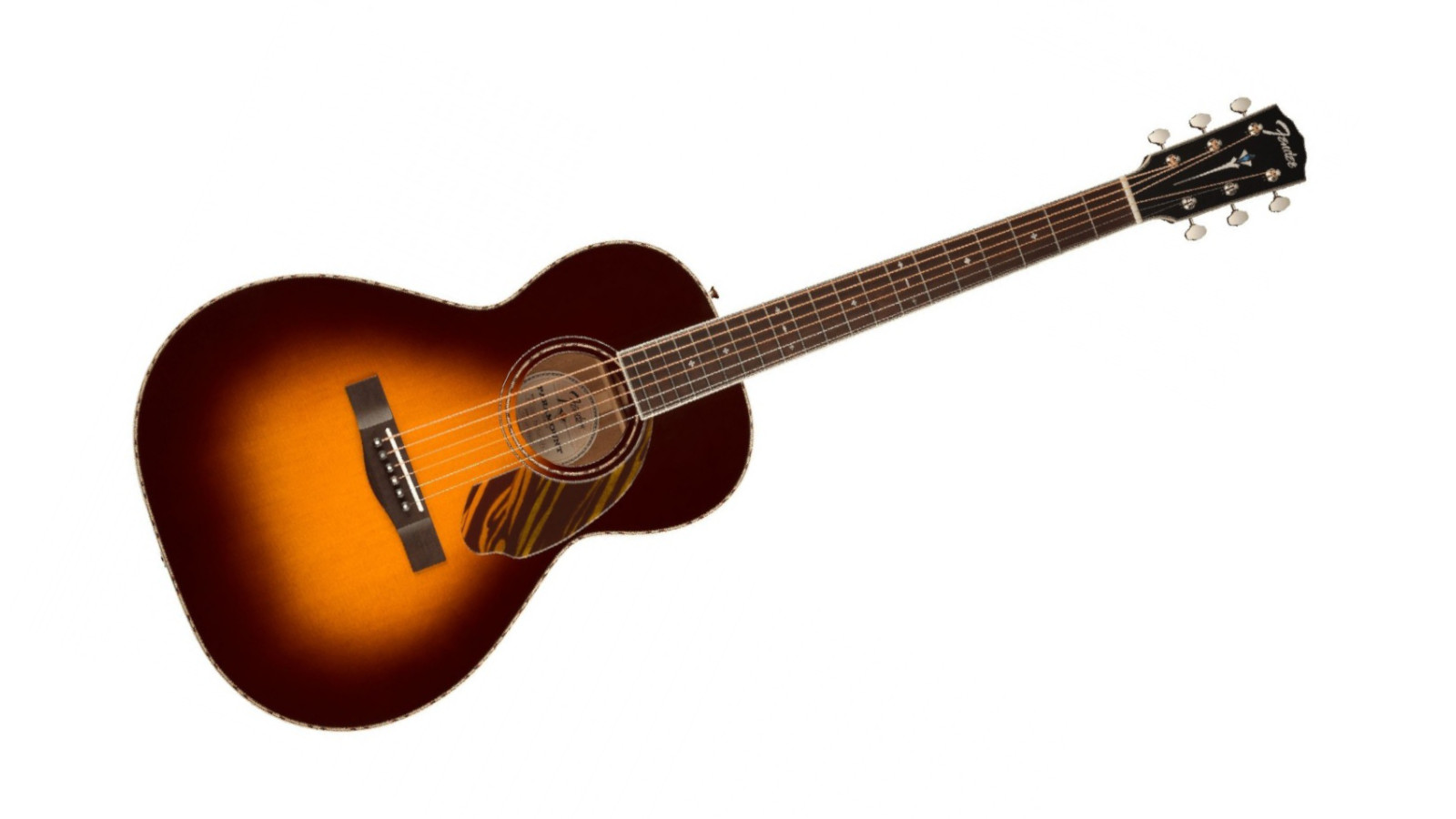
Specifications
Reasons to buy
Reasons to avoid
This is one of the best mid-level parlor guitars around in terms of sound and playability, though it’s also got quite a few premium appointments too. The solid spruce top and solid mahogany back and sides help deliver a crisp and clear tone, with plenty of mid-range presence and a lovely, detailed top end. Fingerpickers will love how well it reacts to playing dynamics, and strummers might be surprised by how much headroom it’s got – this means it’s versatile and can cater for different playing styles.
The Fender PS-220E has some beautiful aesthetic touches too – the white binding is really nice with its feathered checkered purfling, and the headstock and fingerboard inlays finish it off perfectly. There’s a pickup on board too; a collaboration between Fender and Fishman that helps amplify your guitar perfectly. Add to this a decent hard case and you’ve got one of the best parlor guitars that this sort of money can buy.
Read our full Fender Paramount PS-220E review
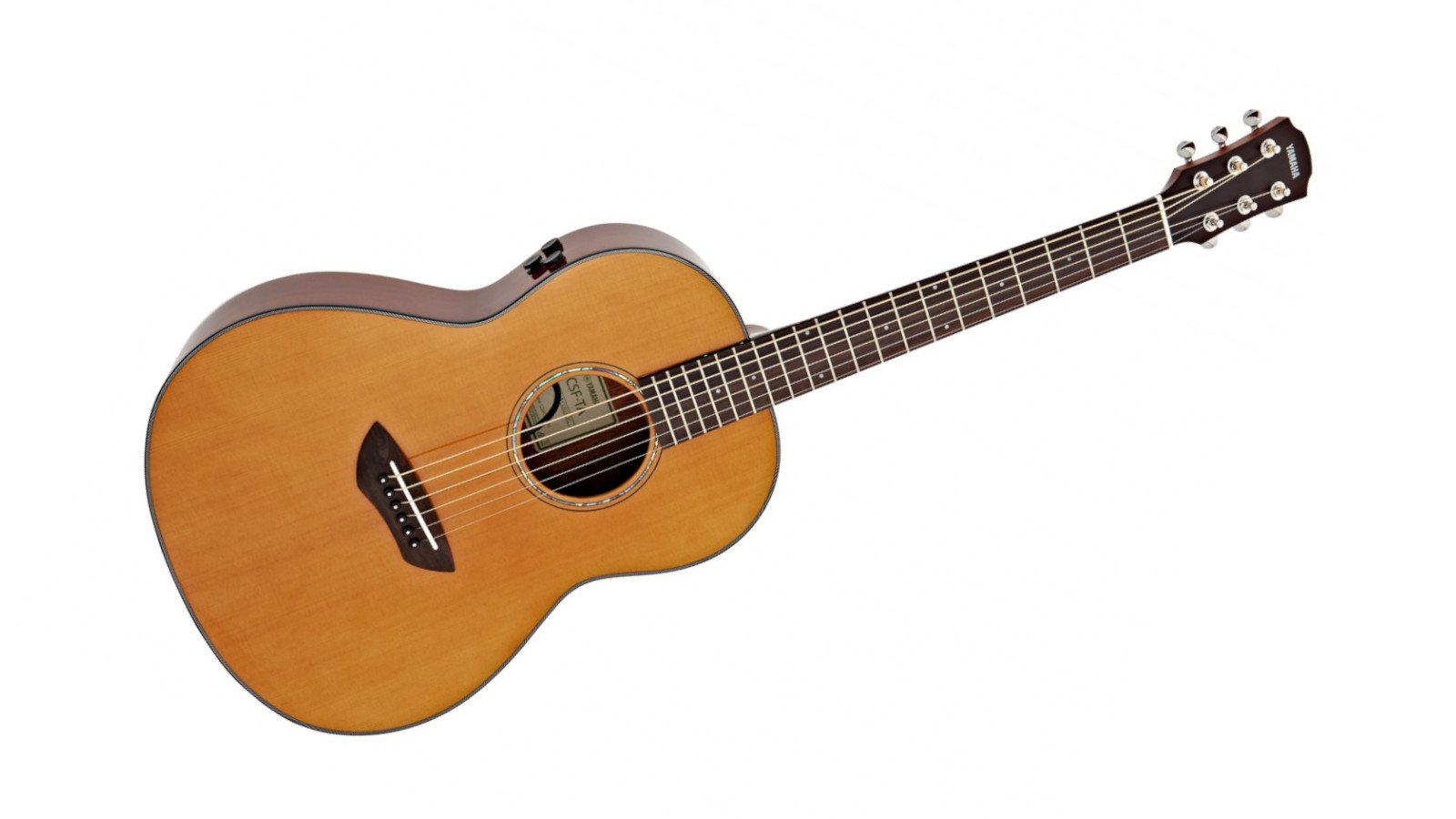
8. Yamaha CSF-TA
Our expert review:
Specifications
Reasons to buy
Reasons to avoid
The TransAcoustic range from Yamaha has been met with great enthusiasm by players and critics alike. These guitars allow you to dial in reverb and chorus without the need for amplification. So, if you want to add more depth and texture to your guitar sound, without plugging into an amp, then this is the answer!
Aside from this amazing feature (it’s a lot more than just a novelty – it’s genuinely very useful), the Yamaha CSF-TA is just a great parlor guitar. It’s punchy sounding, with a nice solid spruce top that sparkles in the top end and is throaty in the midrange. It’s got a laminate mahogany back and sides which contribute some warmth to the guitar’s voicing, too. It’s super comfortable to play, and it comes shipped with a decent gig bag, making it the perfect guitar for traveling with.
9. Martin 0-X2E
Our expert review:
Specifications
Reasons to buy
Reasons to avoid
There isn’t technically a clear-cut definition of a parlor guitar, and at its size, the Martin 0-X2E is on the edge of being a concert guitar. However, it’s got a lot of the mid-range that parlor guitars are known for. It’s also nice and focused with a great attack. It being on the larger end of parlor size (small concert) also means that it’s got a touch more low end than some of the other options on this list.
When it comes to materials, the Martin 0-X2E features a hand-rubbed satin spruce top with a newly introduced cocobolo high-pressure laminate back and sides. The new cocobolo high-pressure laminate adds an aesthetic upgrade that looks much more refined than previous versions. This construction also makes it a solid choice for environments where weather or humidity fluctuates, as the guitar will stay more stable.
We have also been introduced to Martin’s new E-1 pickup system and compared with the Fishman MX that came before, we don’t have any complaints. It sounds great, it’s incredibly comfortable to play, and it’s nice and compact – what’s not to love?
FAQs
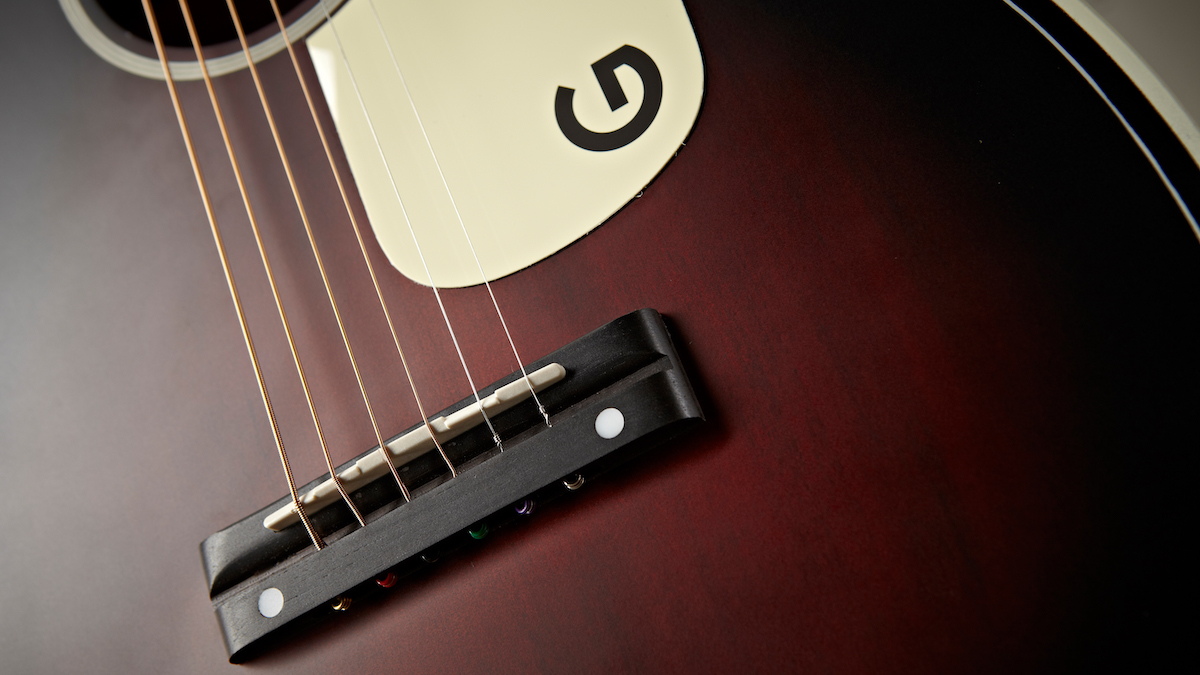
What are parlor guitars best for?
Like most guitars, a parlor can handle almost any genre, but it has a few standout characteristics that make it especially well-suited to certain styles. With its focused, tight, mid-range sound, a parlor guitar is ideal for fingerstyle. Pairing a parlor with fingerpicked blues is a match made in heaven—after all, it’s likely what our forefathers were playing in old saloons. The same goes for country and bluegrass. A parlor’s tight response is perfect for fingerpicking, and when paired with vocals, it’s a winning combination.
Singer-songwriters throughout history have also embraced the unique tone and easy playability of parlor guitars. Legends like Joan Baez and Bob Dylan have relied on them throughout their careers—if it’s good enough for them...
If these genres and artists don’t match what you’re going for, we’d still encourage you to give a parlor a try. These punchy guitars are more versatile than you might think, and a bit of experimentation can lead to new and exciting musical combinations.
Which tonewoods should I consider?
The woods from which a parlor guitar is made will have quite an effect on the sound it produces. Solid woods are generally preferred, as opposed to laminated woods, as they resonate more, produce more overtones and generally just tend to sound richer and better. Many of the best parlor guitars feature a solid top. This means the top part of the body, which is in effect like the speaker of the instrument, is made from solid wood so it vibrates more freely and will produce a better tone when compared to a laminate top. You can then get guitars where the whole body is solid, i.e. the top, back and sides are made from solid woods, which will yield an even richer tone.
Spruce is a common tonewood for the top and is fairly bright sounding, with a nice snap and attack. It can also lend some extra punch in the midrange. It’s versatile so should work for any style of music. Mahogany is used on quite a few parlor guitars too. Some players describe it as ‘woody’ or ‘earthy’ sounding. A lot of old blues players like mahogany for its warmth – if that’s your bag, then a parlor guitar featuring mahogany is worth checking out.
Should I buy a parlor guitar with electronics?
If you’re wanting to use your new parlor guitar at gigs or open-mic nights, or maybe you want to record directly into an audio interface, then going for one that has a built-in pickup will certainly help. With an electro-acoustic guitar you can turn up, plug in and play. You’ve usually got some controls on the side for volume and maybe even a simple EQ so you can dial in your ideal sound. Of course, if this seems unnecessary for your needs, then you don’t want to be paying for a pickup you don’t need, so a straight up acoustic parlor guitar will see you right.
How much should I spend on a parlor guitar?
Price is usually an important factor when shopping for a new guitar. You’ll want to get the best parlor guitar that your money can buy. All of our options on this list are good guitars, though of course, the more you spend, the better the guitar is going to be. You can get a great starter option for under $200. Increasing your budget is going to get you better woods, so you’ll see solid tops just above this price point which resonate better. Go even further and you’ll get all solid wood construction.
A more expensive guitar is also probably going to feature better hardware, which can help it stay in tune better, will probably feel nicer to play and might include a better pickup, giving you a more organic and natural sound when plugged in. Of course if you’re just starting out, then some of these higher end features might be unnecessary.
How we test
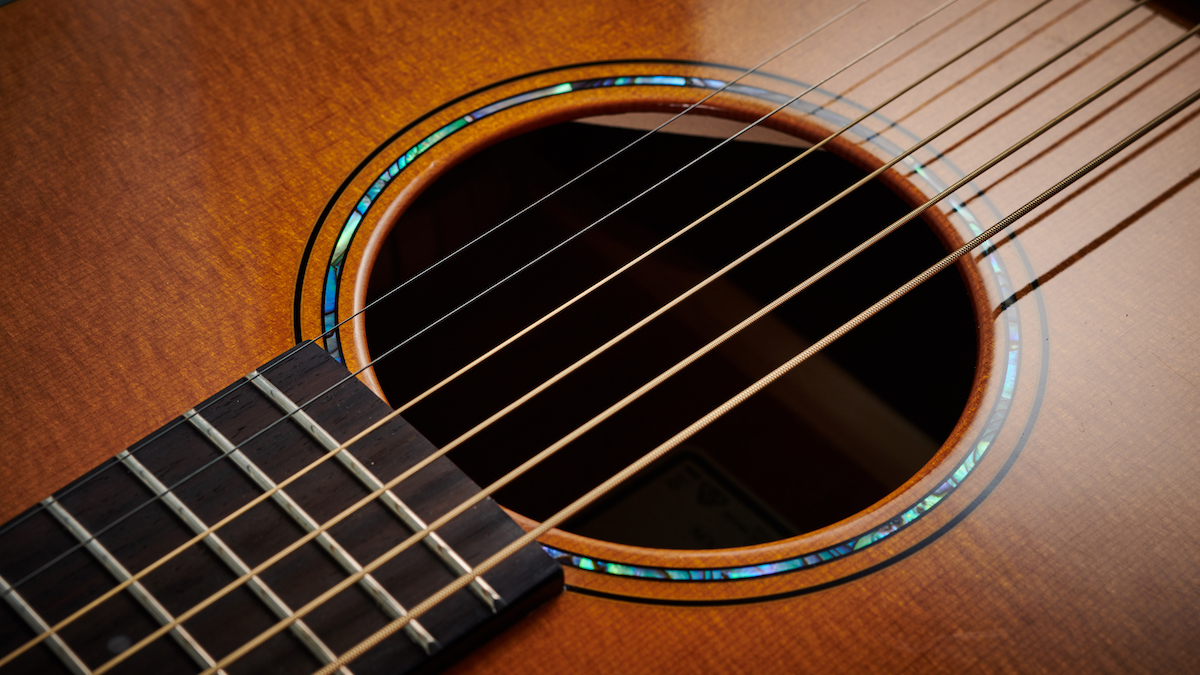
Here at Guitar World we'll test a parlor guitar in much the same way as we would a regular acoustic guitar, or any guitar for that matter. However parlor guitars do tend to differ in terms of the situation they're used in, particularly in the modern age where they're popular as sofa strummers.
Our first check of a parlor guitar is always to examine the build quality in detail. We're looking to see that the instrument has been well put together, and finished exquisitely. That means checking the neck and fret ends, the application of the nut, any binding, as well as the bracing inside. A parlor guitar lives and dies by its body construction, so naturally this plays a huge part of our tests.
Once that's done we'll focus on the playability. As relatively small instruments you'd expect a parlor to feel slightly more cramped than a full-size dreadnought, but we don't want it to feel uncomfortable. It should be easier to fret more complex chords on, but no scramped you struggle to fret chords at all.
With playability out of the way, next up we need to focus on the sound. Parlor guitars are usually more 'boxy' sounding, which can sometimes be used as a negative for full-sized acoustic guitars. Here though, it's part of the charm, and you should fully expect that these guitars aren't as big and brash as a dreadnought.
Overall parlor guitars should share many of the same qualities as a full-size acoustic guitar, but we always appreciate they are a different genre of instrument. Find out more about how we make our recommendations and how we test at Guitar World.
Related buyer's guides
You can trust Guitar World
- Best 3/4 acoustic guitars: more smaller bodied options
- Best fingerstyle guitars, whatever your budget
- Best acoustic guitars under $500: including acoustic-electric models
- Best acoustic guitars under $1,000: get great tone for less
Get The Pick Newsletter
All the latest guitar news, interviews, lessons, reviews, deals and more, direct to your inbox!
After spending a decade in music retail, I’m now a freelance writer for Guitar World, MusicRadar, Guitar Player and Reverb, specialising in electric and acoustic guitars, bass, and almost anything else you can make a tune with. When my head’s not buried in the best of modern and vintage gear, I run a small company helping musicians with songwriting, production and performance, and I play bass in an alt-rock band.
“What blew me away was that everyone wanted the curly maple top. People were calling, saying, ‘I’ve got to have the bird inlays’”: Paul Reed Smith on raising the Standard 24, finally cracking the noise-free guitar and why John Sykes is a tone hero
“It combines unique aesthetics with modern playability and impressive tone, creating a Firebird unlike any I’ve had the pleasure of playing before”: Gibson Firebird Platypus review

